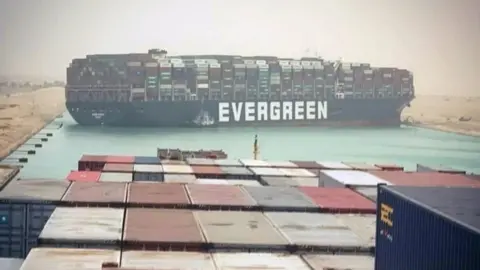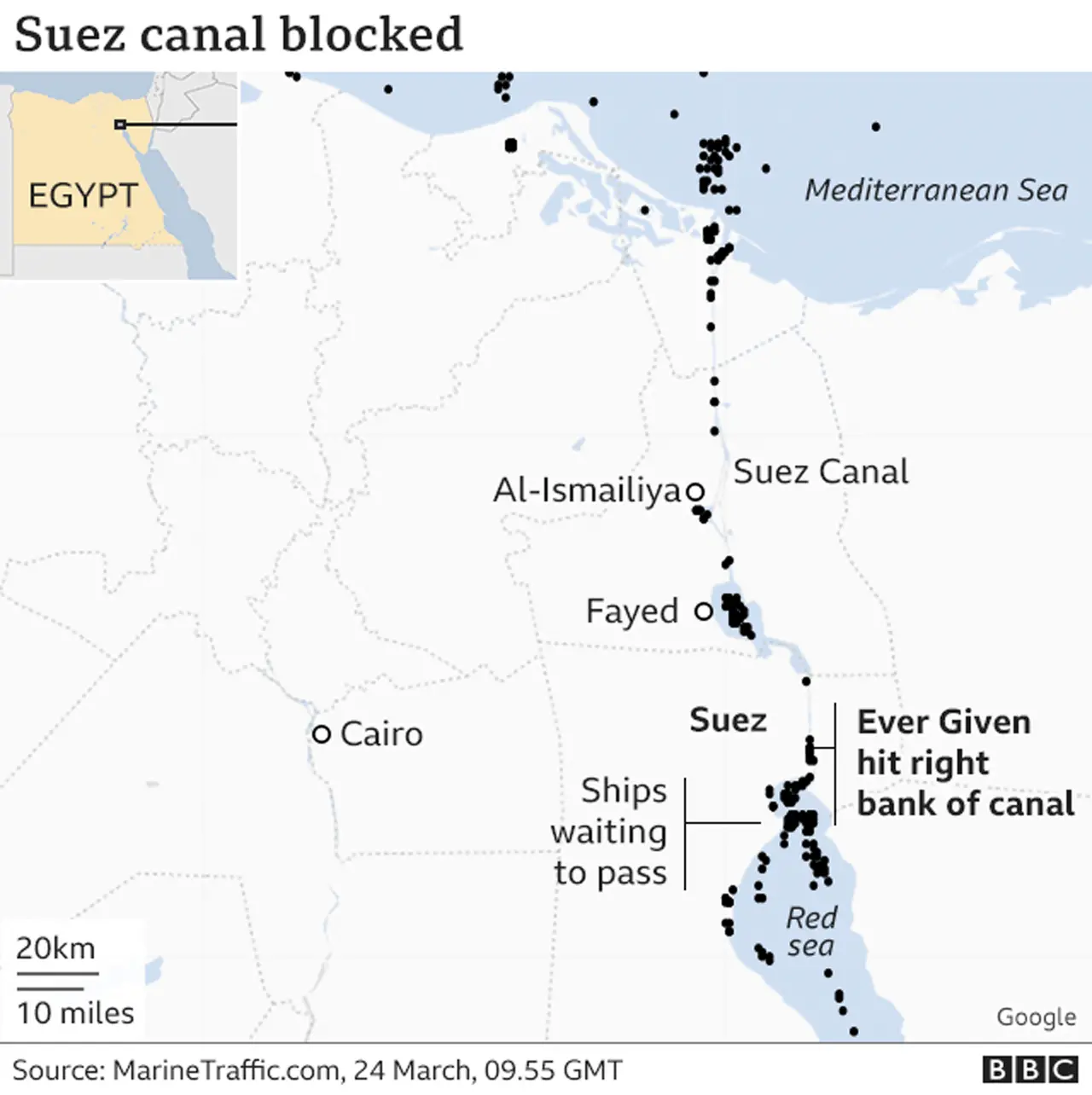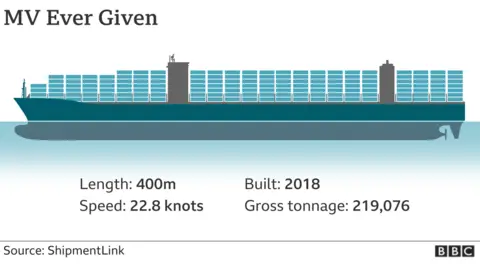Egypt's Suez Canal blocked by huge container ship
A giant container ship the length of four football pitches has become wedged across Egypt's Suez Canal, blocking one of the world's busiest trade routes.
Dozens of vessels are stuck, waiting for rescue boats to free the 400m-long (1,312ft) ship, which was knocked off course by strong winds.
Egypt has reopened the canal's older channel to divert some traffic until the grounded ship can move again.
The blockage sent oil prices climbing on international markets.
About 12% of global trade passes through the Suez Canal, which connects the Mediterranean to the Red Sea and provides the shortest sea link between Asia and Europe.
The Ever Given, registered in Panama and operated by the shipping company Evergreen, was bound for the port city of Rotterdam in the Netherlands from China and was passing northwards through the canal on its way to the Mediterranean.
 EPA
EPAThe 200,000 tonne ship, built in 2018 and operated by Taiwanese transport company Evergreen Marine, ran aground and became lodged sideways across the waterway at about 07:40 local time (05:40 GMT) on Tuesday.
At 400m long and 59m wide, the ship has blocked the path of other vessels which are now trapped in lines in both directions.
The company that manages the container ship, Bernhard Schulte Shipmanagement (BSM), has denied earlier reports that the ship had already been partially refloated.
In a statement, it said its "immediate priorities are to safely re-float the vessel and for marine traffic in the Suez Canal to safely resume".
Experts have warned the process could take several days.


Reuters, quoting local sources, says there are at least 30 ships blocked to the north of the Ever Given, and three to the south.
Evergreen Marine said the ship was "suspected of being hit by a sudden strong wind, causing the hull to deviate... and accidentally hit the bottom and run aground".
BSM confirmed on Wednesday that all crew were "safe and accounted for", with no reports of injuries.
Eight tug boats are working to refloat the ship, and diggers on the ground have been removing sand from where it is wedged into the side of the canal bank.
Dr Sal Mercogliano, a maritime historian based in the US state of North Carolina, told the BBC that incidents such as this were rare, but could have "huge ramifications for global trade".
Fears that the blockage could tie up shipments of crude oil caused prices to rise by 4% on international markets on Wednesday, Reuters reported.
The Kpler energy intelligence service said that more than 20 oil tankers carrying crude and refined products were affected by the jam.


"This is the largest vessel ever to go aground in the Suez Canal," he said, adding that the ship got lodged in the embankment and would have lost power and its ability to steer.
"If they are unable to pull her free... in a high tide, they are going to have to start removing cargo."
Julianna Cona, who says she is on board another ship located directly behind the Ever Given, wrote on Instagram: "Ship in front of us ran aground while going through the canal and is now stuck sideways looks like we might be here for a little bit..."

The Suez Canal is an artery of world trade, connecting the Mediterranean with the Red Sea, and providing an avenue for vessels to pass between Asia and the Middle East and Europe. The main alternative, a passage round the Cape of Good Hope at the southern tip of Africa, takes considerably longer.
On average, nearly 50 vessels per day pass along the canal, although at times the number can be much higher - accounting for some 12% of world trade. It is particularly important as an avenue for oil and liquified natural gas, enabling shipments to get from the Middle East to Europe.
The nightmare scenario, then, is for this crucial route to be blocked - which is exactly what has now happened with the stranding of the Ever Given. The question now is how long the route remains impassable, as a long delay would create serious problems for shippers, delaying consignments of goods and fuel.
On this occasion, reports suggest traffic could be flowing again relatively quickly, in which case the impact will be limited, although there has been a rise in the oil price.
But the incident has shown what can go wrong when the new generation of ultra-large vessels like the Ever Given have to pass through the relatively tight confines of the canal. Although parts of it were expanded as part of a major modernisation programme in the middle of the last decade, it remains tricky to navigate - and accidents can happen.

The ship has the capacity to carry 20,000 20-ft shipping containers, according to Reuters news agency.
Nearly 19,000 ships passed through the canal in 2020, according to the Suez Canal Authority - an average of 51.5 ships per day.
In 2017, a Japanese container vessel blocked the canal after it ran aground following reported mechanical issues. The Egyptian authorities deployed tug boats and the ship was refloated within hours.
The Suez Canal crosses the Suez Isthmus in Egypt - a strip of land between the Mediterranean and Red Sea. The canal is 193km (120 miles) long and incorporates three natural lakes.
In 2015, Egypt's government opened a major expansion of the canal that deepened the main waterway and provided ships with a 35km (22 mile) channel parallel to it.

